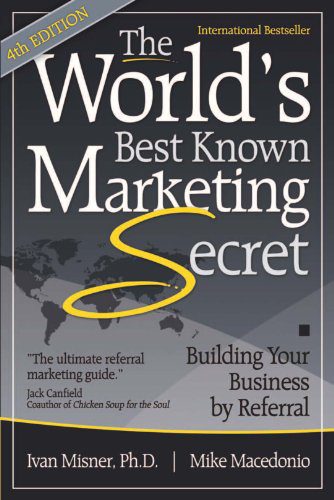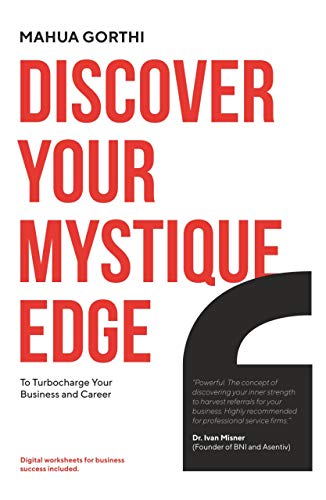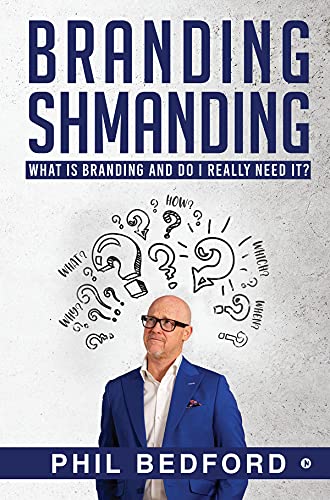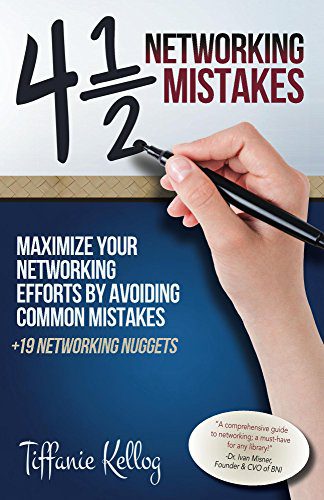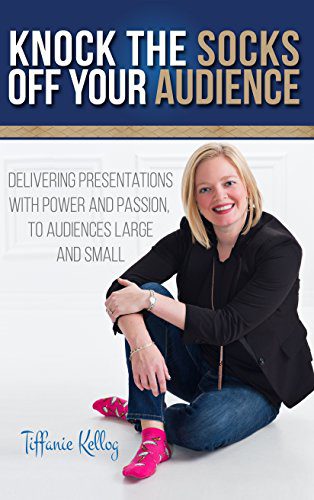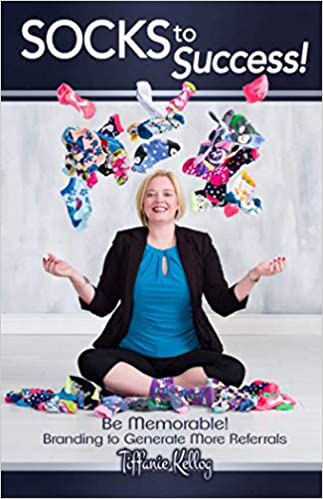As an entrepreneur, successfully bring your services and products to market with the leading consultancy and agency for business development.
Getting Predictable Referrals
You are only a few business contacts away from:
Find out if we can help you develop and market your business and what a strategy might look like for you:
The Way to your Successful Business
We help you to reach more people with your business. We implement the following steps for you:
Your Business Strategy
Everyone pursues a different target group with their business and, of course, a different goal. In the first step, we develop a business strategy that suits your business.
Development of your Business
Every business needs a common thread. We analyze what interests your customers and develop your business concept on this basis, in order to then write it in the shortest possible time.
Marketing & Sales
We help to successfully market your business to attract new customers for your coaching, seminars or services.
Success Stories From Our Customers
Matt O’Connor
Matt O’Connor from Sentient Digital explains in this short video how Asentiv has helped him with his business
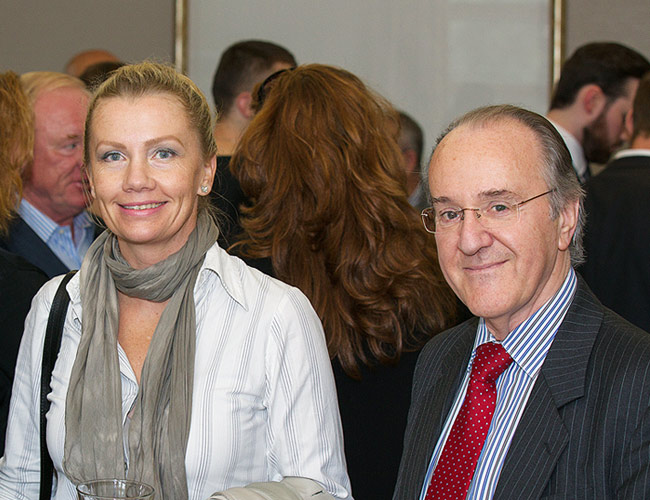
"
We met at a business training event, and soon realised the potential we had to combine our skills and form a company together. For this to happen, re-location from overseas to Dublin in Ireland was a big part of the vision. Despite decades of experience and success working within a corporate customer base, since neither of is native, ‘starting again’ in a new location presented numerous challenges.
From a standing start, Alan Bell (and the rest of the amazing people we have met in Asentiv) has helped us find our feet, and stood by us as we have been building our network. He has become our trusted friend as well as a business support. The teaching of the solid principles and practices of referral marketing we’ve received are going to be with us for a long time, since the need is increasing all the time.
Thanks to you and your work, we regularly interact with a great bunch of business people, and we are both looking forward enormously to doing great business here in Dublin and beyond.
Izabela and Bill
Asentiv is known from:








Our Asentiv Team
Board of Directors
Founders
Back Office Team
About Sandro Moor

After completing his training and further education, Sandro Moor worked in his family’s craft business (House technique). As one of the first and youngest managing directors, he was actively involved in the growth of a well-known network of entrepreneurs.
Sandro Moor has received several international awards in the field of “Referral Marketing” & “Business Relationship Marketing”.
He completed several training courses on this subject in Germany, Austria and the USA. Sandro Moor was Asentiv’s youngest master franchisee in history. Sandro lives with his wife Sonja and their three children in Ascona (Switzerland).
His hobbies are: sport and family, but also wine, whiskey, cigars and fast cars.
On December 1st, 2018, Sandro Moor succeeded the founders Dr. Ivan Misner and Mike Macedonio to become CEO and Chairman of Asentiv Global.
Under his leadership, the company has rapidly tripled in the past two years.
Here's how you can work with us
Due to the high demand, we can only work with a few people.
That is why we are very selective in our selection.
Step 1:
In the first step, fill out the contact form so that we can optimally prepare for the joint and free initial consultation.
Step 2:
In the initial consultation, we look together at the potential of your business and develop a concept for your business model.
Step 3:
If we see potential for success with you in a joint discussion, we will decide to work together.
Book Publications
Who is in your Room?
Can you imagine living a better life? Would you like to surround yourself with more supportive people? There’s hope! You see, the quality of your life depends on the people in your life.THE SIMPLE AND POWERFUL IDEAS IN THIS BOOK CAN CHANGE YOUR LIFE FOREVER.
Who’s in Your Room? introduces you to the concept of your life being like a room—a room where anyone who enters affects your life . . . forever. Although this concept may sound frightening, this book gives you the tools and exercises you need to take control of your room and live the life you desire.This book brings in experts to describe how people leave you with memories that cannot be erased but can be managed.
The Game Changer
We have packed 39 inspiring experiences into this book to show what people like YOU and I can achieve. The stories are uniquely different, and if you have trouble reaching your goals, you’re bound to find an example that resonates with you. You will close this book convinced that NOW is the time to write your success story!
Whether you are a professional, startup, or business owner wanting to take things to the next level, you will find all the MOTIVATION you need right here!
The Emotionally Charged Connection, or E.C.C., is an individual’s emotional “why.”
Unternehmen aufbauen und skalieren: Wie Sie durch Marketing, Rhetorik und das richtige Netzwerk Ihr Business erfolgreich in eine Geldmaschine verwandeln!
Dieses Buch ist die ultimative Anleitung für Gründer und Unternehmer, die ihr Unternehmen erfolgreich aufbauen und skalieren möchten. Autor Sandro Moor bietet konkrete Tipps und Anleitungen, wie Sie durch gezieltes Marketing, überzeugende Rhetorik und das Aufbauen von wertvollen Netzwerken Ihr Unternehmen in eine Geldmaschine verwandeln können.
Eines der größten Probleme, mit denen angehende Unternehmer konfrontiert sind, ist die Herausforderung, sich in einem hart umkämpften Markt zu behaupten und Kunden zu gewinnen. Oft fehlen Gründern und Unternehmern die notwendigen Kenntnisse und Fähigkeiten, um erfolgreich zu werben und ihr Unternehmen zu präsentieren. Dieses Buch unterstützt Sie dabei, diese Hürden zu überwinden und eine solide Basis für das Wachstum Ihres Unternehmens zu schaffen.
The World´s Best Known Marketing Secret
“This is one book you cannot afford to overlook! From beginning to end, The World’s Best Known Marketing Secret is a MUST READ. It outlines the only marketing strategy in existence that is both highly economical and powerfully effective, no matter what business you’re in or where you live.”
The ECG of Entrepreneurship
This book is for those who are thinking to start a new business, are currently in a start-up mode and are successful in their entrepreneurship. For the business owners who are running it passionately, it is also as a reference to remember the basics of a successful enterprise. Successful entrepreneurs can gift this book to upcoming entrepreneurs.
Entrepreneurship is similar to a Game, Some People play it for achieving a lot of success, name and fame. Some People play it for enjoying the work by being positive and enthusiastic.
Discover Your Mystequi EDGE
This is a book for entrepreneurs, professional service firms, etc. who require word-of-mouth marketing and referrals for their businesses to thrive. It will help them discover their own unique abilities and personal super-powers, which the author calls the Mystique Edge.
A fantastic, empowering book for businessmen, life coaches, and owners of professional service firms like Architects, Doctors and Surgeons, HR and Recruitment Firm Owners, Marketing Agencies and Consultants and Financial Consultants.
SE7EN Deadly Start-Up Sins
ust-read for those launching a new business” – Dr Ivan Misner, BNI Founder & NY Times Bestselling Author.
Which sin is behind the business problems keeping you up at night?
Discover the se7en deadly sins of entrepreneurship and the top pitfalls for startups and small-business owners that prevent 50% of all new businesses from reaching their fifth year.
Using real-world examples from small businesses across all types of industry, discover the mindset, skills and approach for success in tackling the problems nearly all new ventures face.
Branding Shmanding : WHAT IS BRANDING AND DO I REALLY NEED IT?
I don’t claim to be a branding expert.
I don’t build brands for a living and I haven’t spent years learning about logo design and color psychology.
However, I do know a great deal about business development.
From my experiences with various growing companies, I’ve discovered that many small business owners struggle to grasp the full value of branding. They hear about the concept and assume they need a name and logo for their business – but they don’t see what branding is truly about.
KISS the Rebel
You don’t need to spend a fortune to build your business. KISS the Rebel is perfect for any business owner or aspiring entrepreneur.
Ignite your imagination and open your eyes to the accessible resources sitting at your fingertips.
The right solution or dream client is just a phone call away. This book gives you practical tips on building the right relationships and advises you to help construct a sustainable business and your dream lifestyle.
I Just Need a Hug : The Need for Offline Connection
During the pandemic lockdown of 2020, people could still communicate and meet digitally with their loved ones. Yet upon actually meeting each other in the real world for the first time, we kept saying and hearing, "I just need a hug!"
It was obvious that there was more to relationships and connecting than just seeing people and communicating digitally. The realisation of a "special factor" associated with the physical and real-world meeting, dawned.
4 1/2 Networking Mistakes
There is a better way to network! People say networking does not work… and it can be true for some, considering they are doing it wrong.
Because you are looking to make networking EASIER AND MORE ENJOYABLE, and want to GROW YOUR BUSINESS BY REFERRAL, this book is for you!
Inside these pages, you will learn why:
• You may not want to pass out business cards when networking
• Your name tag may be hurting – instead of helping – you at events
• The elevator pitch should never be used when meeting new people
• Networking alone won’t help you grow your business
• There is a 1/2 mistake ... and explore the 19 Networking Nuggets!
Enjoy this book as you learn how to MAKE MORE MONEY for your business in LESS TIME by creating referrals for life!
Knock the Socks off your Audience: Delivering Presentations with Power and Passion, to Audiences Large and Small
It you want to succeed in the business world, you have to be able to deliver a knockout presentation.
Whether you are speaking to a huge, captive audience or targeting a pitch to a single individual, you must approach every presentation with one goal in mind: to mesmerize and engage your listeners so thoroughly that they cannot wait to hear more!
In this book, we will explore how to Knock the Socks off Your Audience each and every time.
Learn how to engage your audience, hold their attention, and deliver with power and passion that get results.
In addition, there is one thing you must do in every single presentation you deliver, no matter who is listening.
While most presenters forget to do this, once you know about this simple, powerful secret, you will be able to connect with any audience almost immediately!
Socks to Success: Be Memorable! Branding to Generate More Referrals
How Grow Your Business Through Referrals by Building Your Brand Socks to Success shows how to leverage YOU to create a great brand that sticks in people's minds.
Being top of mind generates referrals and repeat business.
Socks to Success helps by exploring examples of brands and how you might brand yourself, and gives you actionable steps to create success in your business.
Socks to Success explores how to:
•Be top of mind, so clients remember you
•Use YOU to create a personal brand
•Easily convert more customers by increased recognition
•Grow your business and income through referrals
















